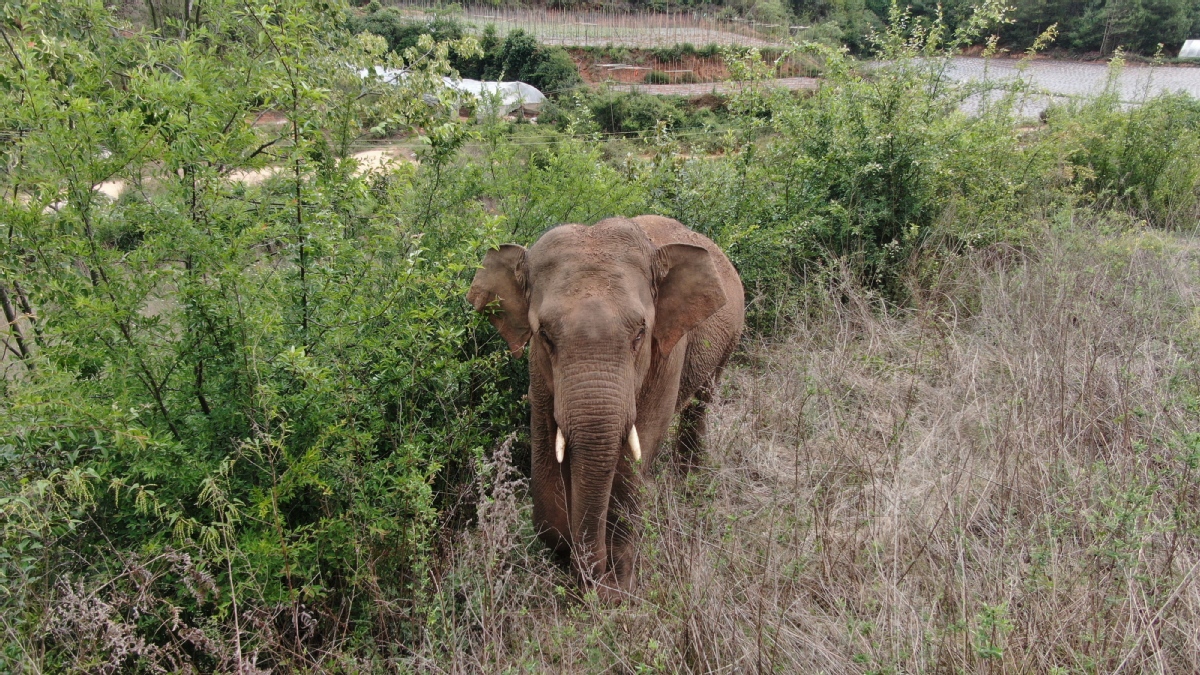Lone elephant sent back to home reserve


A male Asian elephant that strayed from its wild herd a month ago was returned to Xishuangbanna National Nature Reserve in southwestern China's Yunnan province on Wednesday afternoon.
It left Xishuangbanna last year with 16 other elephants and the herd headed north. Two of the elephants returned to the nature reserve early this year.
After traveling more than 500 kilometers, the male elephant left the herd on June 6. The other 14 are still roaming in Xinping county, according to the command office in charge of monitoring their movement.
The male elephant had stayed alone on the outskirts of Kunming, the provincial capital, and the neighboring city of Yuxi for 32 days, and had been about 72 km from the herd.
On July 5, it entered Yuxi's Zanbatang community, only 300 meters from an expressway and 200 meters from the Kunming-Yuxi Intercity Railway.
"Due to safety concerns and to prevent the risk of conflicts between the elephant and people, we decided to capture the elephant early on Wednesday morning," said Xie Yi, a professor from Beijing Forestry University.
He said that after long-term observation, an expert team concluded the elephant was unlikely to reunite with the herd, and that limited natural food resources in the area increased the risks of the animal coming into conflict with people.
Chen Mingyong, a science professor at Yunnan University who has studied wild Asian elephants for years, said the 10-year-old male elephant would have faced great challenges far from its habitat and alone.
"The constant rain and low temperatures, together with the limited natural food resources, would make it very difficult for him to find a proper habitat for a long-term stay," he said.
"Although we've been feeding it, the method is not good for its health in the long run."
He said transferring the elephant was necessary and an internationally recognized practice.
The elephant was sedated with a blow dart, lifted in a cage onto the back of a truck and returned to the nature reserve at 3 pm. The command office said it was in good physical condition under general anesthetic administered by a staff member from the Xishuangbanna Asian Elephant Rescue and Breeding Center.
The center, established in 2002, has saved 24 wild elephants.
"It's common for a subadult male elephant to leave the herd. We gave it comprehensive consideration and agreed that the best place for him is his original habitat in Xishuangbanna," said Shen Qingzhong, an engineer from the nature reserve's management office.
During the elephant's journey back to Xishuangbanna, Shen said its safety was guaranteed by police officers and veterinarians. "Before it was released to the wild, we conducted a health exam and made sure it was healthy," Shen said.
The Asian elephant, which is included on the International Union for Conservation of Nature's Red List of Threatened Species as "endangered", enjoys Class-A protection in China, the same level afforded the giant panda.
Yunnan is the sole habitat of wild Asian elephants in China. Before the 1970s, the species was threatened due to a number of factors, including a surge in the human population, shrinking forest areas and illegal hunting. The number of elephants dropped significantly.
However, due to determined protection efforts in recent decades, the Asian elephant population in China has risen to 300 from 170 in the 1970s.
Hou Liqiang and Li Yingqing contributed to this story.
- A glimpse of Xi's global insights through maxims quoted in 2024
- China's 'Ice City' cracks down on ticket scalping in winter tourism
- Iron stick yams revitalize Wenxian county
- Party chief of Guilin under investigation
- Two radio telescopes put into use to support deep space exploration
- Joint action transforms Mekong region




































